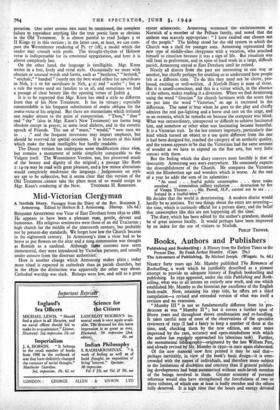Mid-Victorian Clergyman
A Norfolk Diary. Passages from the Diary of the Rev. Benjamin J. Armstrong. Edited by Herbert B. J. Armstrong. (Harrap. 12s. 6d.) BENJAMIN ARMSTRONG was Vicar of East Dereham from 1850 to 1888. He appears to have been a pleasant man, gentle, devout and humorous. His religious sentiments were those of an old Tractarian ; high church for the middle of the nineteenth century, but probably not by present-day standards. We forget how low the Church became in the eighteenth century. In Armstrong's time a vicar had to be brave to put flowers on the altar and a sung communion was thought as Romish as a cardinal. Although these customs now seem immemorial, they were introduced by Victorian parsons, and usually under censure from the diocesan authorities.
Here is another change which Armstrong makes plain ; today more ritual is expected in cathedrals than in parish churches, but in the 185os the distinction was apparently the other way about. Cathedral worship was slack. Bishops were low, and still to a great
extent aristocratic. Armstrong witnessed the enthronement at Norwich of a member of the Pelham family, and noted that the anthem was scarcely appropriate : "I have exalted one chosen out of the people." The bishop stood for the old system in which the Church was a shelf for younger sons. Armstrong represented the new type of middle-class clergyman with a vocation, who attached himself to ritualism because it was a sign of life. But ritualism was still fatal to preferment, and in spite of hard work in a large, difficult parish, Armstrong stayed at East Dereham until he retired.
Nearly all diaries from the past are interesting in one way or another, but chiefly perhaps for enabling us to understand how people felt at a different time. To do this they need not be clever, pro- found, exciting or well-written. A Norfolk Diary is none of these. But it is unself-conscious, and this is a virtue which, in the absence of the others, makes reading it a diversion. When we find Armstrong using the word " Grecian " for church furniture with the scorn that we put into the word "Victorian," an age is recreated in the difference. The same is' true when he goes to the play and chiefly admires the real gas-lighting and a horse and cart on the stage, and to an oratorio, which he remarks on because the composer was blind. What was extraordinary, unexpected or difficult to achieve fascinated him, and somehow or other what was fascinating became beautiful. It is a Victorian trait. In the last century ingenuity, particularly that kind which turned an object to a use quite different from the one it had been designed for, reached the category of an aesthetic quality, and the reason appears to'be that the Victorians had the same amount of wonder as we have to expend on the fine arts, but very little contact with them.
But the feeling which the diary conveys most forcibly is that of insecurity. Armstrong sees wars everywhere. He constantly expects the disestablishment of the Church. He compares the Victorian with the Elizabethan age and wonders which is worse. At the end of a year he adds the sum of its calamities : "As usual . . . fearful public catastrophes . . . three trains smashed . . . tremendous colliery explosion . . . destruction by fire of Vienna Theatre . . . Mr. Powell, M.P., carried out to sea . . . Ireland In a fearful-ate."
He decides that the world is deteriorating. A modern diarist would hardly be so anxious. Yet two things about the entry are arresting— the tone, which is curiously official for a private diary, and the belief that catastrophes like this are not happening all the time: The diary, which has been edited by the author's grandson, should be of great interest locally. It would perhaps have been improved by an index for the use of visitors to Norfolk.
PHILIP TROWER.


































 Previous page
Previous page